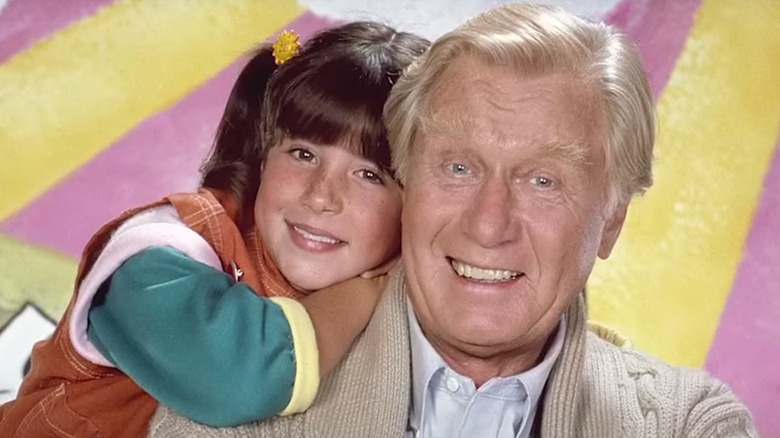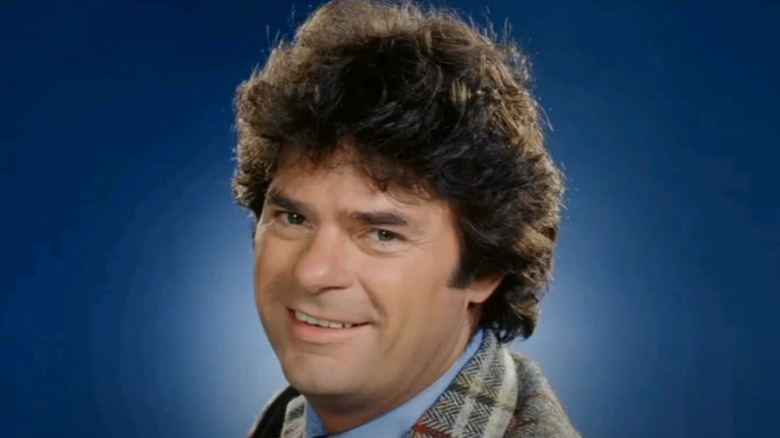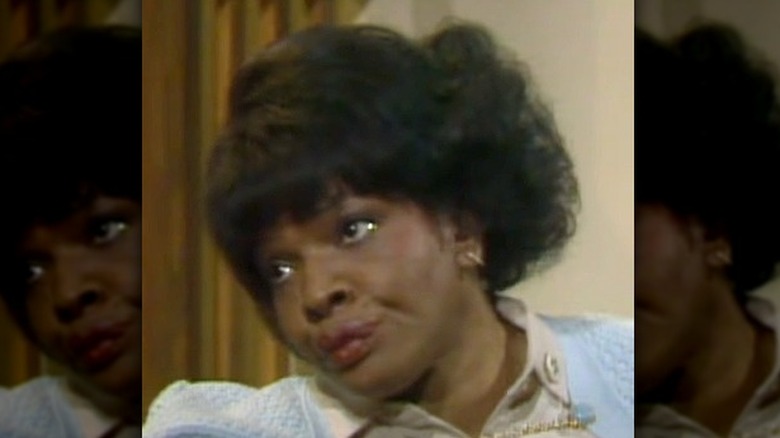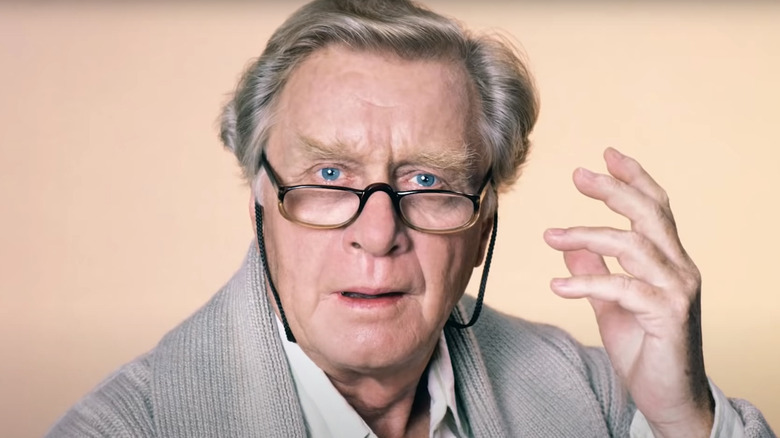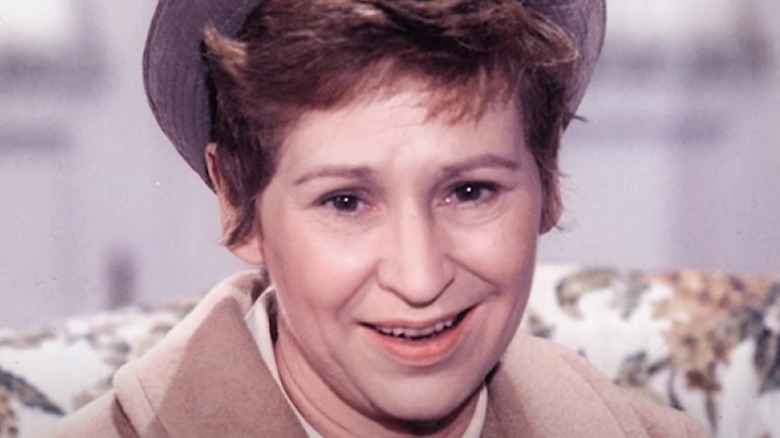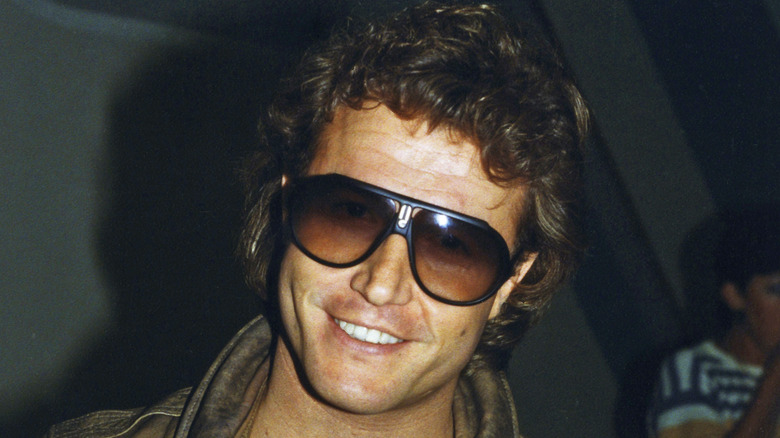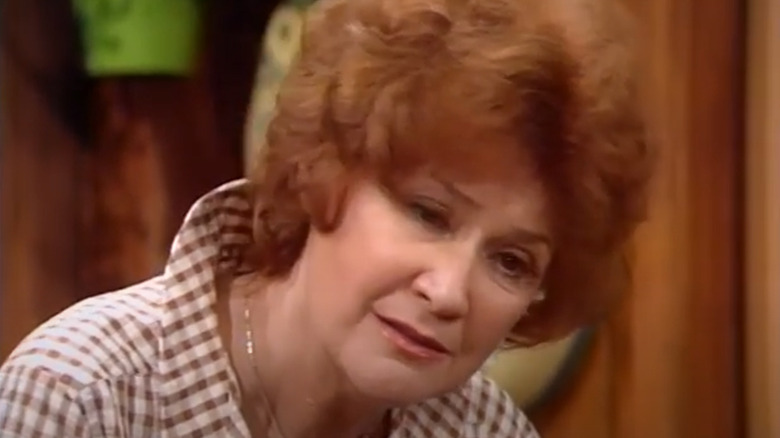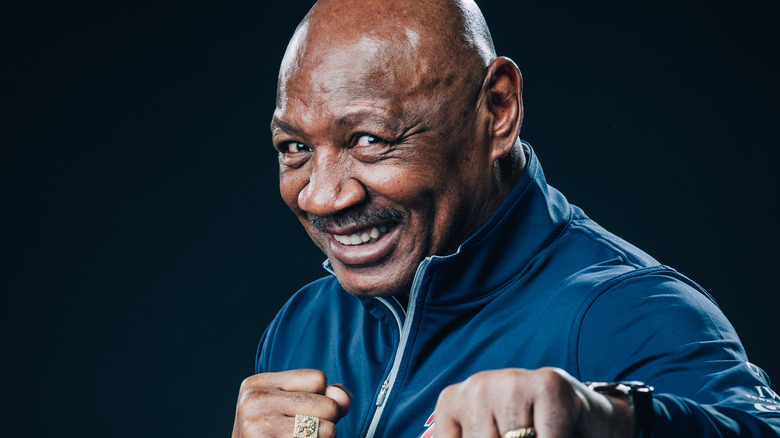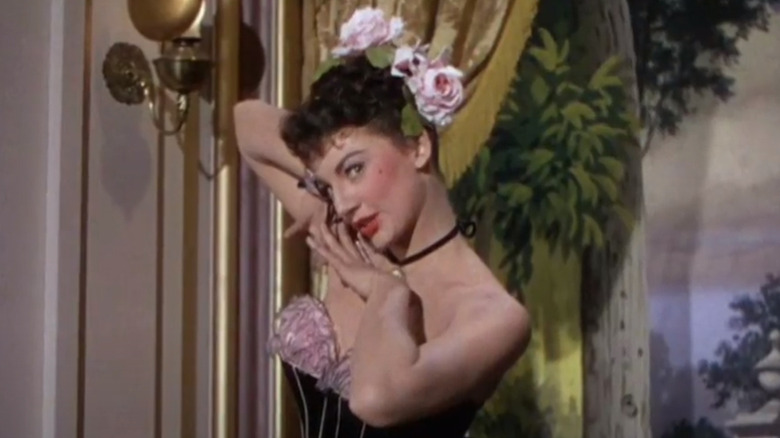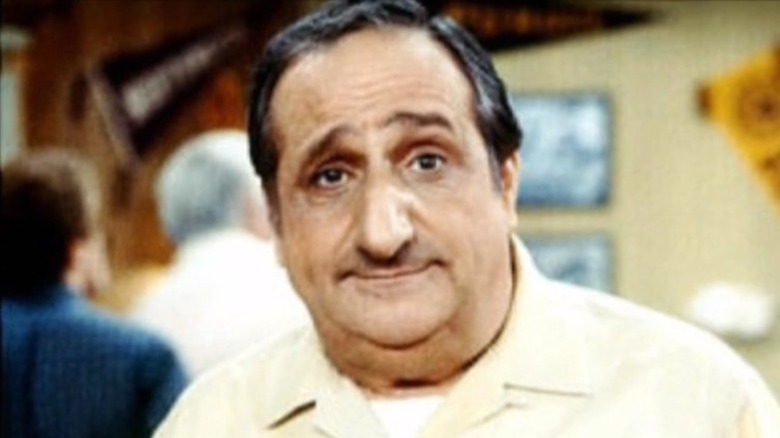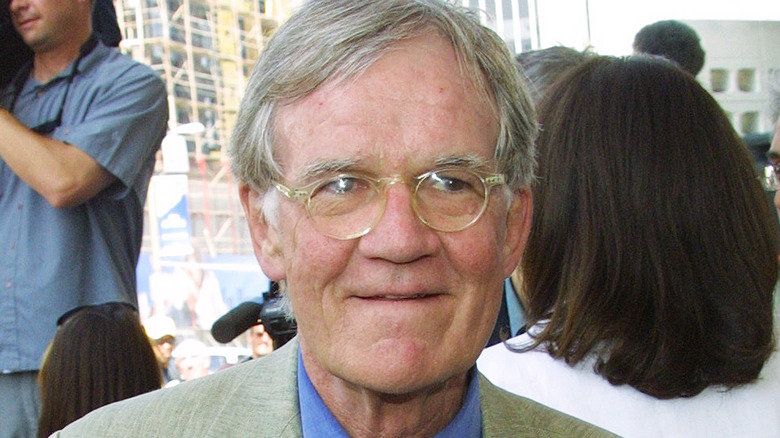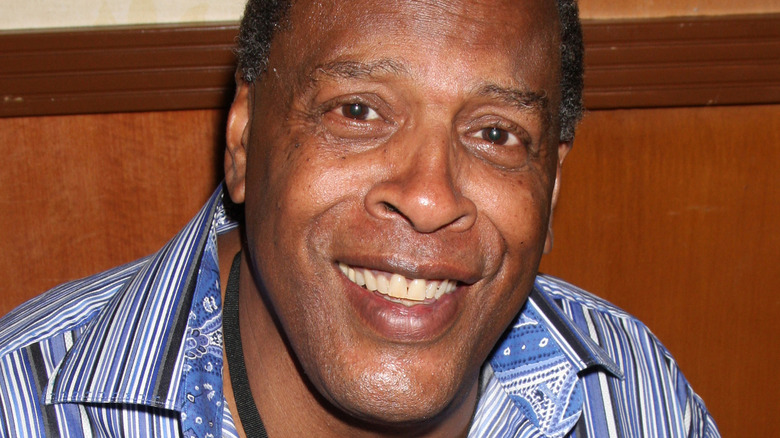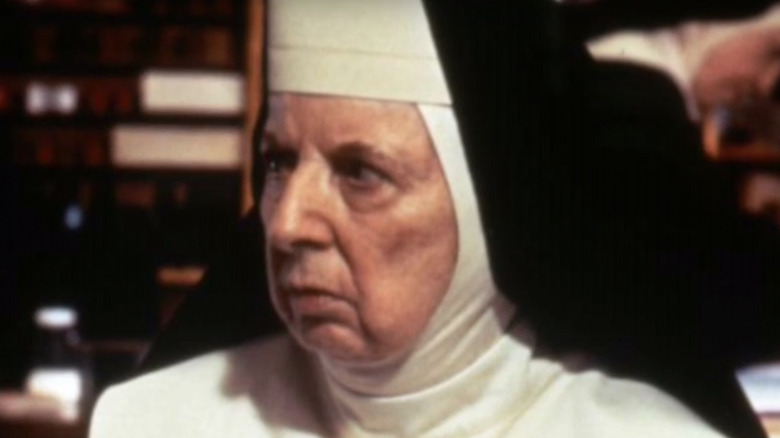Stars From Punky Brewster You Didn't Know Died
Ever since the first comedic offering, "Mary Kay and Johnny," hit the small screen in 1947, families were totally nuclear, with Mom, Pop, two kids, and the occasional pet comprising the lineup. Over time, showrunners tinkered with the premise, introducing elements like guardianship ("Family Affair"), interracial couples ("The Jeffersons"), widowed parents ("Julia," "The Brady Bunch"), divorce ("One Day at A Time"), and mixed-race adoption ("Diff'rent Strokes"). Then came "Punky Brewster" in 1984, which introduced a few more bittersweet premises involving the titular abandoned, homeless child (Soleil Moon Frye) finding shelter in a vacant apartment suite until Henry Warnimont, the building's grouchy caretaker (George Gaynes), jumps through an irritating series of hoops to adopt her. Technically, the household unit was limited to Punky and Henry, although several folks in the complex, including an elderly nurse (Susie Garrett), and school chums in essence became the youngster's family.
While juggling vibes from heartwarming to outright sad, "Punky Brewster" only lasted two seasons on NBC, although a rabid, dedicated audience warranted another two-year extension via syndication, even spawning an animated version of the show. In 2021, NBC's streaming service, Peacock, revisited "Punky Brewster," with Frye playing the character as a single mother. Unfortunately, the show was axed after only one season. Regretfully, a lot of folks who made up much of the cast of the original series, as well as a few memorable guests, weren't around for the sitcom upgrade. Here's a look at a few of them.
Frank Bonner (1942–2021)
In one episode of "Punky Brewster," Frank Bonner played Cheapo Chester, who sold Henry a refrigerator. It wasn't a role that Bonner spent hours on perfecting, not only because his appearance was brief, but it also reinforced a stereotype with which he was very familiar. And fans who saw that cameo might have clicked in that the actor had a more prominent part elsewhere as sleazy advertising salesman Herb Tarlek on the late '70s sitcom "WKRP In Cincinnati." In the show, Tarlek was strictly old-school, pushing the ethics boundaries while wheeling and dealing and constantly hitting on receptionist Jennifer Marlowe. But according to Loni Anderson, who played Marlowe, Bonner was nothing like his character. In a statement, per The New York Times, she recalled that he was "one of the funniest men I had the pleasure of working with" and was "the nicest man I have ever known."
Bonner got a kick out of playing the character, always seen in the tackiest garb from checkered suits to white buck shoes. He even returned for a reboot of the show more than a decade later. But what the actor really enjoyed was directing, a task he performed on six "WKRP" episodes. He'd later apply those talents to shows like "Family Ties" and "Who's The Boss?" and was even on both sides of the camera on "Just the 10 of Us" and "Saved by the Bell: The New Class." Bonner died of complications of Lewy body dementia at 79.
Susie Garrett (1929–2002)
Throughout the entire run of "Punky Brewster," the titular character literally had a whole building of tenants looking out for her, and Susie Garrett happened to be one of them. As registered nurse Betty Johnson, Garrett wound up as a no-nonsense grandmother role model to young Punky, often dispensing pearls of wisdom that her foster father Henry was at wit's end to provide. Garrett had plenty of practice, for years having to push Henry to improve the apartment complex in which she lived. Not having an onscreen portfolio wasn't an obstacle for Garrett, whose four-season stint on "Punky Brewster" was her first-ever paid TV gig. At one point during her first year, she managed to land two appearances on "The Jeffersons," as a sister of tart-tongued maid Florence Johnson, played by her real-life sibling Marla Gibbs.
The Detroit native was weaned more on music than acting while growing up, cutting her teeth as a jazz singer for much of her adult life before gravitating toward musical theater, a craft she also taught before she was lured to the small screen. After "Punky Brewster" left the airwaves in 1988, she landed one cameo on the sitcom "227" and landed a movie part in "Wicked Stepmother," which starred Bette Davis in the title role. Eventually, she and Gibbs teamed up in Los Angeles, where they started the Crossroads Arts Academy. Garrett died of cancer at 72, shortly before her portrayal of women's rights activist Sojourner Truth aired on PBS.
George Gaynes (1917–2016)
Art culture has long demonstrated how irresistible grouches can be once someone is able to knock down those emotional walls, from Ebenezer Scrooge and Lou Grant to "The Simpsons" bartender Moe Szyslak and "Punky Brewster's" Henry Warnimont, deftly played by George Gaynes. For the four years that "Punky Brewster" was on the air, fans dug the payback they received in Warnimont's changing demeanor once he fell for the charms of an abandoned child he discovered in the building he maintained. It was certainly a far cry from his other, equally famous portrayal of the more authoritarian Commandant Eric Lassard, unable to reel in a gaggle of oddball rookies throughout the seven films that comprised the comedic "Police Academy" franchise.
For years, Gaynes was a go-to actor for supporting roles, such as playing a senator in the 1997 critical fave "Wag the Dog" and a sleazy soap star in the 1982 flick "Tootsie." Gaines even enjoyed recurring roles in real soaps, from "General Hospital" to "Search for Tomorrow," along with scores of prime-time comedies and dramas. Gaynes' versatility and civility while working on whatever project required his services contributed to his longevity, according to his longtime agent Jonathan Howard. "He was really one of the true gentlemen in this business and was working steadily for 50 years or more," Howard told The Hollywood Reporter. "A sad, sad loss. But he had a really long, great life." Gaynes died of natural causes at 98.
Alice Ghostley (1923–2007)
Alice Ghostley made one appearance on "Punky Brewster," albeit a small one which saw the title character start a gossip column for her school newspaper. Pity that Ghostly didn't get more profile in the episode, given her ability to come up with a character who could be shy and demure one moment, and scatterbrained and verbose the next. That ability to transport onto the screen a lively version of what was in the script made her a favorite among producers, who cast her in a wide array of portrayals in nearly 100 movies and television projects. One of them, a recurring role as lusty, devil-may-care widow Bernice Clifton on "Designing Women," earned her a supporting actress nomination at the 1992 Primetime Emmys.
While she was a regular on the TV live theater circuit in the early '50s, Ghostley was more prolific on Broadway, starring in such productions as "A Thurber Carnival" and Leonard Bernstein's "Trouble In Tahiti." While she set the stage ablaze with her singing and comedy skills, it was actually a drama, "The Sign in Sidney Brustein's Window," that earned her a Tony supporting actress award in 1965. By the time she won that title, she was already leaning more toward television, where she became familiar to mainstream audiences in "Bewitched," playing a befuddled spell-casting cousin named Esmerelda. On the big screen, she became even more prominent with supporting roles in "The Graduate" and "To Kill A Mockingbird." Ghostley died of colon cancer at 81.
Andy Gibb (1958–1988)
Australian pop star Andy Gibb sat in for a 1985 episode of "Punky Brewster," even serenading the show's star, Soleil Moon Frye, at a piano playing one of his tunes, "I Can't Help It." It turned out to be the last occasion he'd appear on a sitcom. At the time, he wasn't in huge demand for the small screen, having performed a cameo on "227" two years earlier and a brief stint in a 1982 Showtime revue, "Something's Afoot." Much of it had to do with the singer's nose-diving career that first caught fire in the '70s with his first big hit, "I Just Wanna Be Your Everything." When Gibb first hit the big time, it was on the heels and in the shadows of his older siblings Barry, Robert, and Maurice, who formed the nucleus of The Bee-Gees, which dominated the decade with hits like "Jive Talkin'" and "Stayin' Alive," the latter among the many popular songs they contributed to the box office movie monster "Saturday Night Fever."
Unlike the more seasoned Bee-Gees, who had survived ebbs and flows since bursting onto the scene during the '60s from Down Under, fame was still new territory for Gibb, who quickly showed signs of not being able to handle success. He soon developed a cocaine addiction, which caused him to split from girlfriend Victoria Principal (of "Dallas" fame), and by the '80s, he was reportedly a million dollars in debt. He died of an inflammatory heart virus at 30.
Dody Goodman (1914–2008)
One role that seemed out of character for Dody Goodman was in playing Punky Brewster's schoolteacher, Mrs. Morton. Casting someone with a voice like "a Tweetie Pie cartoon bird strangling on peanut butter" (per The New York Times) as an education authority figure might have otherwise been a disaster, but Goodman had the moxie to make it work well enough to be asked back for three more episodes. After all, Goodman had already earned her stripes playing Mr. Drummond's opinionated sister in a recurring role on "Diff'rent Strokes" a few years earlier. Ditto for arguably her most famous role as Martha Shumway, who for 325 episodes played actor Louise Lasser's mother in the blue-collar soap parody "Mary Hartman, Mary Hartman," even contributing her quirky, high-pitched tonsils to the opening title theme.
Oddly enough, Goodman's first TV foray was on a real soap opera, "Search for Tomorrow," although it was her voice that led her to Broadway during the '50s, when she was billed as Dolores Goodman. Her bubbly, idiosyncratic personality won over converts among theater patrons, even attracting "Tonight Show" host Jack Parr, who frequently invited her onto the program; one such appearance resulted in Goodman getting an Emmy nomination. In later years, Goodman scored cameos on shows like "Crazy Like A Fox," "Murder She Wrote," and "Boston Common," even putting that telltale larynx to good use voicing the '80s animated series "Alvin and the Chipmunks." Goodman died from natural causes at 93.
Marvelous Marvin Hagler (1954–2021)
Punky Brewster was not only known for her charm, she could also stand up to a great deal of adversity, which was where boxing great Marvelous Marvin Hagler entered the picture in a second season episode. It all started when a school buddy named Moose steals lunches from Punky's friends until she stands up to the offender. Unfortunately, things don't go well for Punky, who gets clobbered by Moose in the restroom. Enter Hagler, a friend of Punky's fourth-grade teacher, who tries to teach the basics of self-defense to the youngster, who turns out is anything but a physical fighter. All is not lost, however, when Punky's best friend Cherie comes up with a plan to decimate Moose once and for all.
Hagler certainly demonstrated his love for children, but against professional pugilists, he was formidable. Throughout his career, which saw him win 62 fights, including 52 by knockout, Hagler possessed a singular focus of flattening opponents on the canvas. "If they cut my bald head open, they will find one big boxing glove,” Hagler said, per ESPN. "That's all I am. I live it.” His career surprisingly ended in 1988 when he lost to Sugar Ray Leonard in a highly disputed split-decision, in which pundits believed Hagler actually won. Angry over the result, he immediately quit boxing and embarked on an acting career in Italy, where he starred in action flicks like "Indio" and "Virtual Weapon." He died unexpectedly at 66 from causes never made public.
Allyn Ann McLerie (1926–2018)
Allyn Ann McLerie appeared in three episodes of "Punky Brewster," starting with her portrayal of a state attorney opposing custody of Punky to Henry Warnimont. But it was in back-to-back episodes the following season when McLerie really made an impression on the sitcom's audience. In that two-parter, McLerie played Maggie, Henry's longtime love interest until they lost touch with each other due to the Pearl Harbor attack in 1941. But when she shows up for the first time since the war, Henry plans to marry her. It's all good news to Punky, until she runs away after finding out those nuptials would result in her attending a boarding school in Europe. Casting McLerie as Maggie seemed to be no accident, since she and George Gaynes (who played Henry) had been married in real life since 1953.
McLerie didn't just cut her teeth in acting, she also cut the rug several times on the big screen as a dancer with impeccable skills, like the ability to drop-kick a cowboy hat off an unassuming patron in the movie "Calamity Jane." She was equally adept at acting, performing in the dance-marathon flick "They Shoot Horses, Don't They?" and playing Jennifer Grey's mom in "Dirty Dancing." She later landed a recurring role in the series "The Days and Nights of Molly Dodd," followed by a cameo in the final "Police Academy" movie, which also featured her husband. McLerie died of Alzheimer's at 91.
Al Molinaro (1919–2015)
Al Molinaro's career highlights teeter heavily towards amiability and to that end, he's played some of the most loveable characters on the small screen. When casting agents were debating on who would play Santa Claus in one episode of "Punky Brewster," all bets were off once Molinaro's name came up. Unfortunately, St. Nick became a footnote to a bigger issue when Punky impulsively decided to shoplift a Yuletide gift for George, which in the process put an innocent friend behind bars. That cameo also turned out to be one of Molinaro's final appearances on TV. Fortunately, he cast a much bigger impression on audiences a decade earlier, as restaurateur Al Delvecchio, who takes over Arnold's drive-in eatery on "Happy Days," ensuring that Fonzie and the gang got their fill of burgers and fries.
It turned out to be Molinaro's steadiest gig ever, and one he frequently defended. "In the industry, they used to consider us like a bubblegum show," he said during a reunion special in 1992, per The Guardian. "But I think they overlooked one thing. To the public in America, 'Happy Days' was an important show." Molinaro's previous prolific stint was playing dimwitted officer Murray Greshler in the first TV adaptation of the Neil Simon movie "The Odd Couple," although he did manage a consistent itinerary of appearances on shows like "The Love Boat" and "Fantasy Island," even scoring a cameo in a Weezer video. Molinaro died of complications from a gallbladder infection at 96.
Jack Riley (1935–2016)
Neurotic character actors seldom got as nutty as Jack Riley, who had to alter his personna a tad to play film director Daryl Snipes shooting a dog food commercial in one episode of "Punky Brewster." But he got more than a handful of interference from Punky, who volunteered her dog Brandon as the ad's star attraction, even though the canine was hardly trained for such a task. Granted, Riley assumed far more arcane roles, but nothing topped his best known character, Elliot Carlin, a regular psychiatric patient whose phobias run from snails to agricultural products on the '70s sitcom "The Bob Newhart Show." The portrayal was so well-received, Riley would bring Carlin back years later as cameos on the sitcom "ALF" and the hospital drama "St. Elsewhere."
He was also among director Mel Brooks' favorite actors to cast in flamboyant supporting roles in movies that included "High Anxiety," "History of the World: Part I," "Silent Movie," and "Spaceballs," while children may have recognized his voice-over work as scatterbrained genius Stu Pickles on such animated Nickelodeon outings as "Rugrats" and "All Grown Up!" But his key to connecting with audiences was with a deadpan execution that emitted an awkward wit indicating there was more lurking beneath his character than met the eye, a style that fit well with his one-off appearances on shows that included "Seinfeld," "That '70s Show," "Family Matters," and "Night Court." Riley died from pneumonia at 80.
Meshach Taylor (1947–2014)
As delivery man Anthony Bouvier, Meshach Taylor became a comedic foil for four Southern entrepreneurial gals in "Designing Women," a tug of war that at least scored an Emmy nomination for him in 1989. It might have been prophetic for Taylor to land a similar role in "Punky Brewster" a few years earlier, but the reality is that the actor had been kicking around Hollywood for several years, getting a number of supporting actor parts before his career jumped a few notches. Like most thespians whose lives dangled on the hopes of an audition at the beginning, he started off slowly, playing a parking lot attendant on "Barnaby Jones," a potpourri of tiny roles on three episodes of "Lou Grant," and an orderly during the final season of "M*A*S*H."
Over time, the roles got bigger, and Taylor started getting noticed, first as colorful window dresser Hollywood Montrose in the film comedy "Mannequin," then later as another foil to eccentric actor Dabney Coleman in "Buffalo Bill." He also landed a steady gig as a teacher and principal on the Nickelodeon sitcom "Ned's Declassified School Survival Guide." Even when Taylor started to show signs of illness, he continued to work, appearing in two episodes of "Criminal Minds," his last project before dying of cancer at 67. "He said he was getting ready to make his transition through," said "Designing Women" co-star Jackée Harry to "Entertainment Tonight" shortly after his death. "He said 'I'm passing through, baby.'"
Mary Wickes (1910–1995)
Long recognized as one of Hollywood's busiest actors, Mary Wickes played on countless primetime dramas and sitcoms, including a nun in one of two appearances she made on "Punky Brewster." The more ecclesiastical portrayal on the sitcom may have sown the seed for something a little bigger, since Wickes wound up a few years later playing a nun once again, this time with a larger part opposite Whoopi Goldberg in the film comedy "Sister Act" and its sequel. But those anecdotes from her career don't even penetrate the cover of a portfolio that's kept pace with the entertainment world for decades.
Her first line of work goes back as far as 1934, when she starred in a short film called "Art Trouble." From the start, she stood out from other more genteel female actors, thanks to what UPI called a "blunt, quick delivery" that had her playing tougher portrayals in early classics like "The Man Who Came To Dinner" and "Now, Voyager," both with the equally steel-tongued Bette Davis. Between filming stints, she took to the Broadway stage in nearly 30 productions, all the way to 1979, when she appeared in a remount of "Oklahoma!" She jumped to TV, appearing in several productions from "Zorro" to "Highway To Heaven." In later years, she posed as a live model for the masochistic Cruella DeVil in the animated "101 Dalmatians" and even voiced a gargoyle in "The Hunchback of Notre Dame." Wickes died at 79 from surgery complications.

